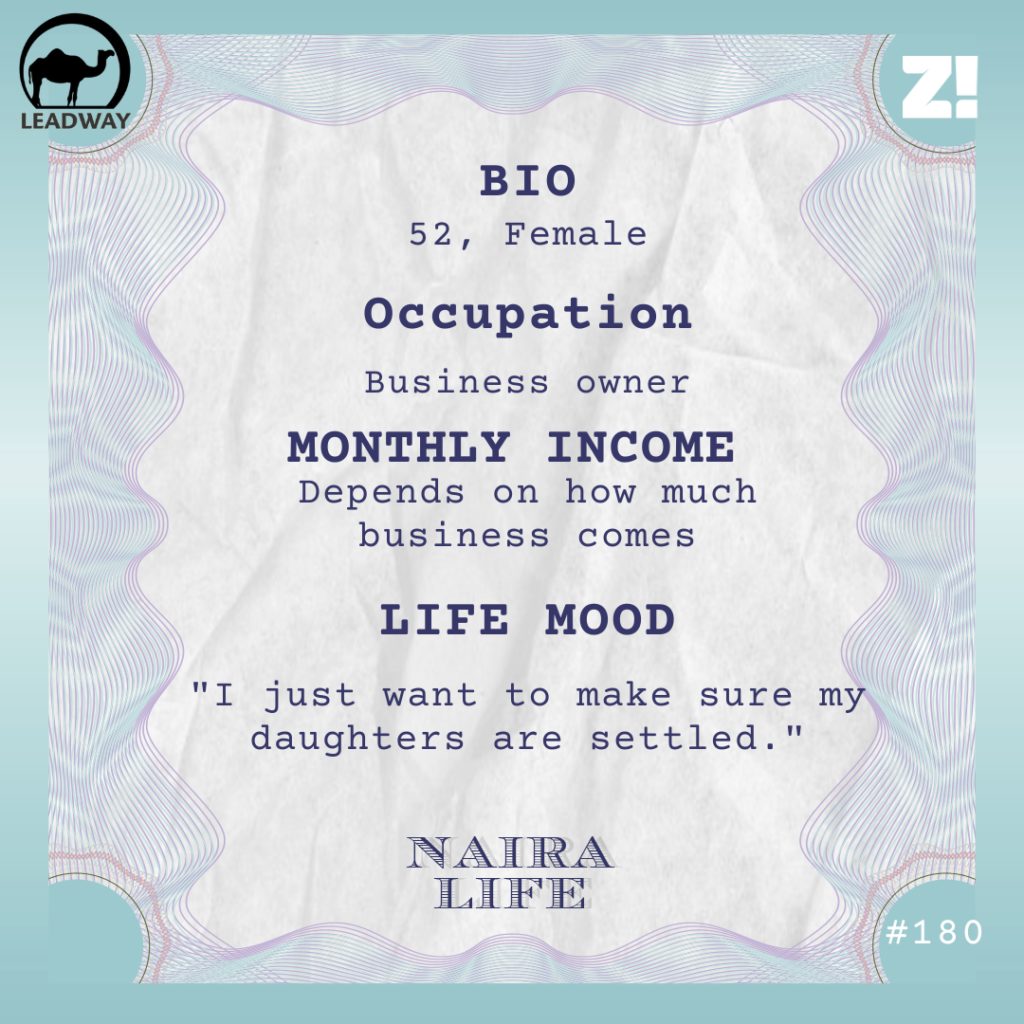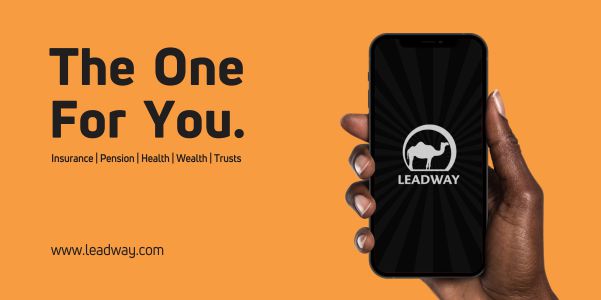Every week, Zikoko seeks to understand how people move the Naira in and out of their lives. Some stories will be struggle-ish, others will be bougie. All the time, it’ll be revealing.
Leadway offers simple insurance products that protect you and everything you care about. From your personal belongings, to your health, your life, and that of your family. Sign up on Leadway Assurance to learn more and get started.
Between 1987 and 1995, the 52-year-old on this #NairaLife trained and worked as a programmer. After that, she became a secretary and rose through the ranks at the same company for the next 20 years. She retired because of office politics and now owns a laundry business.

What’s your earliest memory of money?
My father gave me pocket money when I started secondary school in 1983. I went to a boarding house, so he gave me the money right before I went to school. I think it was about ₦500 split into clean, fresh 50 kobo and ₦100 notes.
I was 13, so having my own money was great because I could buy all the snacks I ever wanted.
₦500 in 1983 seems like a lot of money for a 13-year-old
We were comfortable. My dad was an accountant and my mum sold fabrics in big bulks. I never even spent the entire ₦500 in a term. I’d take the rest home and spend it on more snacks.
What was it like growing up in the ’70s and ’80s?
It felt safe. There was a freedom I can’t quite explain. We weren’t scared of kidnappings or killings, and moving abroad wasn’t something everyone was considering. As children, we went out to play and our parents weren’t afraid something would happen to us.
What did you want to be when you grew up?
A lawyer. I liked the idea of fighting for people’s rights, and I liked lawyers’ uniforms whenever I saw them on TV. By the time I finished secondary school in 1987, my mother didn’t allow me study law.
Why?
According to her, lawyers received a lot of curses because of the nature of their jobs. She didn’t want to lose me to people used to do juju for lawyers.
What did you do instead?
I pursued my next interest, which was computers. At the time, because computers were new, they were becoming more and more popular. `I did a computer programming training for three years, after which I got a job in 1990 at an auditing firm as their computer operator and programmer. The pay was ₦700.
I initially enjoyed the job, but as time went on, I got bored, so I switched to another, much bigger, auditing firm in 1995 to become a secretary.
When you look back, do you regret not staying in tech?
No. My job as a secretary was interesting, and my career grew to the highest ranks. Even though the tech industry is big now, I have no regrets.
What did you do as a secretary?
I helped my bosses organise their days, set up their meetings, took notes at meetings and just ensured everything was well organised.
What was the pay like?
It was ₦22k at the start. Really good money.
At first, I didn’t do much with it because I lived with my parents. But by the time I got married in 1996, I left my parents’ house and had to start raising my family. I had my first child in 1996 and two other children in 1998 and 2000.
I eventually had to raise them as a single mother because my husband left.
Why?
I like to say he left because of his own inadequacies. It was never really great from the start, so we just separated.
Tell me what being a single parent was like
Oh, it was difficult. But I’m thankful my parents were there for me. We didn’t live too far from them, so they always helped me take care of my daughters when I couldn’t. My siblings were also supportive. The early stages were very rough, but as children grow older, they begin to learn how to take care of themselves. For example, the older one learnt how to bath for the younger ones at some point. So when I was up by 5 a.m. preparing breakfast, lunch and dinner before work, she’d be getting them ready. Then on weekends, I’d do a comprehensive bath for all of them.
What about financially?
The major thing I had to spend money on was fees. That was tough too. Thankfully, they all went to schools where I could split the payments. So if the school fees were ₦100k for each child, I could pay ₦20k each at the beginning of the term and pay the rest through the term.
What was work like all this time?
In my 20-year period at the company, my role grew from secretary all the way to executive assistant to the CEO and COO of West Africa, and I managed about three other top officials. Before I retired in 2015, I stopped working as an executive assistant and set up a secretariat and administrative department for the company which I headed.
How much did your salary increase?
I started at ₦22k in 1995 and ended at over ₦350k in 2015.
Why did you retire at 45?
I began to feel uncomfortable working there. Decisions began to be taken with partiality. The environment became hostile. And I’m an open person — I don’t know how to do eye-service and not tell people when they’re doing something wrong. So I just left while I was still on good terms with everyone.
What was your plan for post-retirement?
If I tell you that I had a plan, I’m lying. But I knew I didn’t want to work in the corporate world anymore. I had put that behind me. The only thing that was left was business. I also knew I didn’t want to do a business where I’d have to rent a shop because of rent wahala. I eventually decided to learn interior decoration because I felt like I had a good taste for beautiful places.
But first, I travelled to the US just to unwind. Over there, I stumbled upon some materials — books and DVDs — on interior decoration. They helped me strengthen my decision to go into interior design.
What does a retired CEO assistant’s finances look like?
I didn’t have savings and investments, but I received a gratuity. That’s how I survived. I don’t live a flashy life, so it’s not like I was spending that much money.
When did you start making money from interior design?
2016. My sister and a close friend are architects, so they began to recommend me to their clients. In addition to interior design, I decided to help people do post-construction cleanups for their sites. I hired young men to handle the cleaning and paid them.
Between 2016 and 2020, I made money from interior design and post-construction cleaning.
Was it enough to survive?
It was. I was home alone most of the time because my daughters were in university. And it was enough to send them to school and survive on my own.
What changed in 2020?
I decided to open a laundromat. My home’s compound is big, so I set up a structure, bought machines and hired people to do the work. The laundromat meant I made money more frequently. So if I didn’t get clients for interior design and post-construction cleaning, at least we were making money from the laundromat every week. These days, it’s every day.
How’s the business now?
We’ve been able to acquire industrial machines. On an average month, afterwe’ve restocked, other business expenses are gone and salaries for both my staff and I have been paid, we still have a profit of over ₦100k to spare.
I still do the other two businesses now, but only when I get clients from people recommending me — which isn’t so often these days.
Do you have savings and investments now?
Yes. I save and have shares now because even though my children are grown, I want to be able to support them when they want to do things like master’s and weddings. They’re the reason I save and have investments.
What’s the plan for your business in the future?
I want it to become a household name in the laundry industry in Nigeria. So, as we grow, we want to expand and open more branches and offer satisfactory services.
Is there something you want right now but can’t afford?
My first daughter is trying to go abroad for her master’s. I want to be able to support her financially.
Can you share how you spend money in a month?
What would you rate your financial happiness on a 1-10 scale?
Maybe eight over ten. I think it’s an eight because I’m content. I don’t struggle to get anything.
Leadway offers simple insurance products that protect you and everything you care about. From your personal belongings, to your health, your life, and that of your family. Sign up on Leadway Assurance to learn more and get started.





